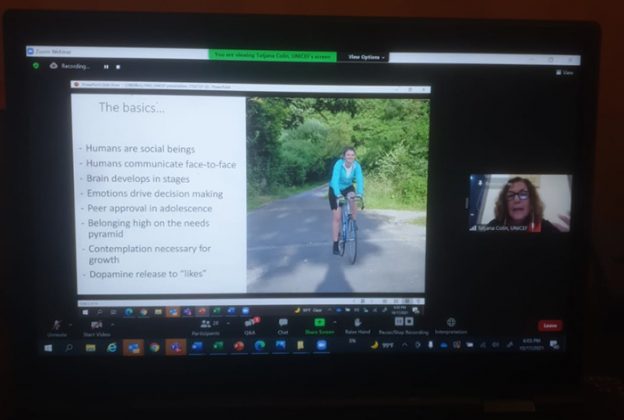The United Nations in the State of Kuwait represented by the Resident Coordinator Office, the WHO Office in Kuwait, and UNICEF, in partnership with the Ministry of Health and Ministry of Education in Kuwait organized an expert-led webinar to highlight the needs and opportunities for a mental health strategy to be considered, adopted and actioned by all schools in Kuwait. The webinar also aimed to build consensus into the mental health needs and interests of children and adolescents whilst highlighting the responsibility and respective contribution of a wide range of stakeholders. The webinar will form an early stage of a mental health policy planning exercise for schools by identifying the need for and key features of a school mental health policy.
Mental health problems can manifest in children as sadness or worry, attention deficits, behavioral difficulties, and deterioration in school performance. Early screening and deployment of effective interventions can reduce the likelihood of continuity and exacerbation of mental health associated impairments into adulthood. The rise in violence, drug addiction and depression among adolescents in Kuwait over the past few years has been alarming. A number of contributory factors have been found to exert impact on mental health; these include stressful events in early life such as child abuse and neglect, social isolation and negative lifestyle habits, including increased passive screen time and lack of physical activity.
The pandemic has underscored the urgency of putting in place collective action plans and policies that protect those most vulnerable and promote their wellbeing. Plans must recognise that children’s and adolescents’ development stage can influence the degree of their vulnerability to mental health disorders. Accordingly, schools must be well positioned and prepared to identify the need for early interventions to reduce risk factors for mental health disorders and promote protective factors.
Dr. Tarek El-Sheikh, UN Resident Coordinator and Representative of United Nations Secretary-General noted that “Schools need to adopt innovative solutions to keep linkages open with students, particularly in states of emergencies,” further emphasizing that every school should be a mental health-promoting school through a holistic approach that builds on relationships with students, families and teachers.
Dr. Assad Hafeez, WHO Representative in Kuwait called all stakeholders to attend to the global statistics which reaffirm a need for urgent action, Dr. Hafeez followed that “globally the largest burden of mental health falls on young people.”
The Ministry of Health was represented by Dr. Abdullah AlSanad, who stressed that “Schools are central to nurturing a child’s skills of social connection and emotional regulation,” and that the Ministry of Health in Kuwait, in partnership with the Departments of School Health and Primary Healthcare are in the midst of preparing a mental health plan for school-aged pupils.
The unprecedented length of school closures imposed because of COVID-19 may have contributed to significant impediments to children’s overall wellbeing and development, not just their learning. With school reopening plans and the focus on accelerating learning to remediate losses, it is crucial that effective mental health and wellbeing plans are put in place so as not to lose sight of the unequivocal link between mental health and educational attainment. Equally so, these plans must necessarily factor in teacher preparedness to take on this responsibility and their personal wellbeing by mainstreaming into them the requisite capacity building exercises, tools, and modalities for the sharing of best practices by educational psychologists.
The webinar ended with a call to continue the conversation towards actional mental health strategies for schools across the nation. Speakers in the webinar were: Dr. Bibi Alamiri, MD, ScD Kuwait Center for Mental Health Adult, Child & Adolescent Psychiatrist; Shaimaa Allami Psychologist at Ministry of Education Department of Mental Health and Wellbeing; Dr. Tatjana Colin Head of UNICEF Office in Kuwait, Chief, Early Childhood Development UNICEF; Professor Atif Rahman Professor of Child Psychiatry, University of Liverpool , and Fatema Albader Middle school English Teacher, Bayan Bilingual School Kuwait.



















